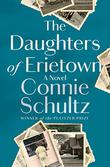If you weren’t already familiar with Connie Schultz’s work as a political columnist—she won a Pulitzer Prize in 2005 while at the Cleveland Plain Dealer—you may have gotten to know her in the past few years as one of the most congenial people on social media. Her Facebook page and Twitter feed feature her takes on the news along with pictures of her dogs, Franklin and Walter, her grandchildren, and her husband, U.S. Sen. Sherrod Brown. The title of her 2007 memoir, …and His Lovely Wife, was a wry response to finding herself treated like an appendage during Brown’s first campaign following their marriage. Now Schultz has written a novel, The Daughters of Erietown (Random House, June 9), in which “the evolving role of women in middle America in the second half of the 20th century is illuminated by the story of one Ohio family, its secrets and failures, its hopes and dreams,” according to our starred review, which calls it “a masterful debut.” We recently spoke with Schultz about the novel; the conversation has been edited for length and clarity.
How would you describe your novel?
It’s set in a small working-class town on the shores of Lake Erie, written by a woman who grew up in a small working-class town on the shores of Lake Erie. Of course, it’s a story about women over four generations, but it’s also about the men they love. I think the term working class only appears once. But to me, it means people who have hopes and dreams just like everyone else, who want more for their kids, who want more for their communities. And they try to get on that trajectory until the big problems come and they have no money to fix them. And that’s when everything can fall apart. That’s the story of so many working-class families I know. And they’re diverse, by the way; I hope that came across in Erietown. It’s not just white people—I get really frustrated with that idea.
This book reminded me a lot of some of the feminist novels from the 1970s by writers like Marge Piercy and Marilyn French.
Well, I consider that a real compliment, because I’m very fond of their writing. I came of age in the ’70s. So I read The Women’s Room when I was in college, I have the first edition of Our Bodies, Ourselves. That made it easy to do research—I just had to pull it off the shelf. I thought, if I’m going to focus on women in this novel, and I want to tell a story that spans a period of time, it makes sense for me to include a period of time that I knew well, but it’s amazing how much we don’t remember from our childhoods. You know those little pamphlets you can get about the year you were born? “Here are the top songs, here are the top....” I have one for every single year represented in the book. I found them on eBay, on Etsy, because I couldn’t get over how much I couldn’t remember.
What made you decide to write a novel?
I finally decided to get serious about it when I realized what was stopping me—and that was fear. I had to live what I’ve always told my kids and what I’ve written, which is the only regrets you’ll have are the things you were afraid to try. I did a TEDx talk about four years ago about how women of my generation—I’m 62—are the first to really have large numbers who think we shouldn’t become invisible at the age of 50. So many of my friends have done these incredible things much later in their lives. Unlike our mothers did too often, we don’t have to feel used up. It’s “What do we do next?”
Are there any books that you love or books you used as models?
 Well, start with Grace Paley, period. I can’t adequately convey what it’s like to be a working-class Protestant kid in Ashtabula, Ohio, who first started reading Grace Paley in high school and thought, Wow, our family has a lot more in common with a Jewish woman living in New York than a lot of the novels I’ve been assigned to read in class, which were mostly by male writers.
Well, start with Grace Paley, period. I can’t adequately convey what it’s like to be a working-class Protestant kid in Ashtabula, Ohio, who first started reading Grace Paley in high school and thought, Wow, our family has a lot more in common with a Jewish woman living in New York than a lot of the novels I’ve been assigned to read in class, which were mostly by male writers.
And A Tree Grows in Brooklyn. [From] the first time I read that, the same scene still stays with me now. It’s the scene in the doctor’s office, do you remember that? Francie and her brother are there, and the doctor is saying to the nurse, “Look how dirty they are. That little boy, he’s so filthy.” And when Francie gets up there, she essentially says, “You don’t need to tell me, we already know we’re dirty.” I mean, what she’s saying is, “I heard every word you said. I understand exactly what you think of us.” I remember that feeling of being a working-class kid.
I remember my daughter had to read A Tree Grows in Brooklyn in college. She and I started talking about it, and I told her about that scene, and I realized it was not a story I had told her about my own childhood. I was so busy trying to make her feel confident in herself, and I wanted her to believe in all her options, that I hadn’t told her that I came to this in a different way. I came to it in part from having people judge me strictly on where I came from.
Laurie Muchnick is the fiction editor.



































